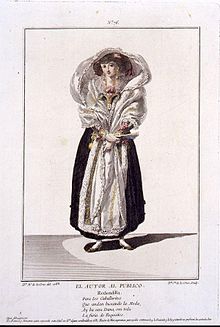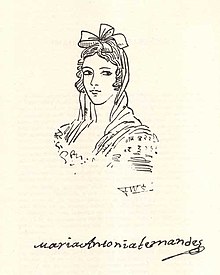María Antonia Vallejo


María Antonia Vallejo Fernández , stage name La Caramba , (born March 9, 1751 in Motril ; died June 10, 1787 in Madrid ) was a Spanish actress and singer of flamenco with a mezzo-soprano voice .
Life
María Antonia Vallejo Fernández was a daughter of Bernardo Vallejo and María Manuela Fernández. She went to Madrid in 1776 and made her debut at the Teatro de la Cruz in the theater company of Manuel Martínez.
She sang in buffo operas and tonadillas and performed wild Andalusian gypsy songs . She got the stage name La Caramba after an exclamation ¡caramba! at the end in one of her tonadillas or because of a large bow set with diamonds that she wore in her black hair. After her marriage in 1781 she ended her career, but then separated from her husband and returned to the stage in the specially composed tonadilla El luto de Garrida por la muerte de la Caramba . She suddenly retired from the stage in 1784 and entered a monastery. In addition, she is said to have been moved by an unhappy love, according to other sources by the reproaches of a penitential preacher.
In 1942, Zarzuela La Caramba , composed by Federico Moreno Torroba based on the libretto by Luis Fernandéz Ardavin, was premiered in Madrid . In 1951 Arturo Ruiz Castillo made the film María Antonia "La Caramba" with Antoñita Colomé in the title role.
literature
- La Caramba , in: Großes Sängerlexikon , 2000, pp. 13554f.
- Narciso Díaz de Escovar : Comediantes de otros siglos. María Antonia Fernández, "La Caramba" , in: Boletín de la Real Academia de la Historia , tomo 96 (1930), pp. 774-784
- L. Fernández Ardavín: La Caramba: Zarzuela en tres actos . Madrid: Camarasa, 1942
- Nicolás González Ruiz : La Caramba . Madrid: Morata, 1944
- Antonina Rodrigo : María Antonia, La Caramba, el genio de la tonadilla en el Madrid goyesco . Madrid: Prensa española, 1972 ISBN 8488191855
- Cándida Martínez López , Susanna Tavera (ed.): Mujeres en la historia de España: enciclopedia biográfica . Barcelona: Planeta, 2000 ISBN 84-08-03541-X , pp. 359-362
Web links
- Literature by and about Caramba in the WorldCat bibliographic database
- Maria Antonia Vallejo Fernández, la Caramba , in: coralarmiz (after Antonina Rodrigo, 1972)
- Maria Antonia Vallejo Fernández, la Caramba , with: Mery Varona
- María Antonia Vallejo Fernández , at: artehistoria
- Antonina Rodrigo García: Vallejo Fernández, María Antonia , Real Academia de la Historia : Diccionario Biográfico Español
Individual evidence
- ↑ La Caramba , at Lazarzuela
- ↑ María Antonia "La Caramba" in the Internet Movie Database (English)
| personal data | |
|---|---|
| SURNAME | Vallejo, María Antonia |
| ALTERNATIVE NAMES | Vallejo Fernández, María Antonia |
| BRIEF DESCRIPTION | Spanish actress and singer |
| DATE OF BIRTH | March 9, 1751 |
| PLACE OF BIRTH | Motril |
| DATE OF DEATH | June 10, 1787 |
| Place of death | Madrid |
